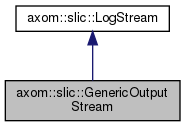Concrete instance of LogStream, which implements functionality for logging messages to a C++ ostream object, e.g., std::cout, std::cerr, a std::ofstream, std::ostringstream, etc. More...
#include </home/docs/checkouts/readthedocs.org/user_builds/axom/checkouts/v0.5.0/src/axom/slic/streams/GenericOutputStream.hpp>

Public Member Functions | |
| GenericOutputStream (std::ostream *os) | |
| Constructs a GenericOutpuStream instance with the given stream. More... | |
| GenericOutputStream (std::ostream *os, const std::string &format) | |
| Constructs a GenericOutputStream instance with the given stream and message formatting. More... | |
| virtual | ~GenericOutputStream () |
| Destructor. More... | |
| virtual void | append (message::Level msgLevel, const std::string &message, const std::string &tagName, const std::string &fileName, int line, bool filter_duplicates) |
| void | setFormatString (const std::string &format) |
| Sets the format string. More... | |
| virtual void | flush () |
| Flushes the log stream. It's a NO-OP by default. More... | |
| virtual void | push () |
| Pushes messages incrementally up the log stream. NO-OP by default. More... | |
Protected Member Functions | |
| std::string | getFormatedMessage (const std::string &msgLevel, const std::string &message, const std::string &tagName, const std::string &rank, const std::string &fileName, int line) |
| Returns the formatted message as a single string. More... | |
| std::string | getTimeStamp () |
| Returns a time-stamp. More... | |
Detailed Description
Concrete instance of LogStream, which implements functionality for logging messages to a C++ ostream object, e.g., std::cout, std::cerr, a std::ofstream, std::ostringstream, etc.
Constructor & Destructor Documentation
◆ GenericOutputStream() [1/2]
| axom::slic::GenericOutputStream::GenericOutputStream | ( | std::ostream * | os | ) |
Constructs a GenericOutpuStream instance with the given stream.
- Parameters
-
[in] os pointer to a user-supplied ostream instance.
- Precondition
- os != NULL
◆ GenericOutputStream() [2/2]
| axom::slic::GenericOutputStream::GenericOutputStream | ( | std::ostream * | os, |
| const std::string & | format | ||
| ) |
Constructs a GenericOutputStream instance with the given stream and message formatting.
- Parameters
-
[in] os pointer to a user-supplied ostream instance. [in] format the format string.
- See also
- LogStream::setFormatString for the format string.
◆ ~GenericOutputStream()
|
virtual |
Destructor.
Member Function Documentation
◆ append()
|
virtual |
- See also
- LogStream::append
Implements axom::slic::LogStream.
◆ setFormatString()
|
inlineinherited |
Sets the format string.
- Parameters
-
format a format string
- Note
- The following keywords in the format string are replaced:
- <LEVEL> with the message type, e.g, ERROR, FATAL, etc.
- <MESSAGE> with the user-supplied message
- <TAG> user-supplied tag
- <FILE> with the filename
- <LINE> with the line number
- <LINE> with the MPI rank
- <TIMESTAMP> date/time the message is logged
An example illustrating how an application can setup the format string is shown below:
References axom::slic::LogStream::append().
◆ flush()
|
inlinevirtualinherited |
Flushes the log stream. It's a NO-OP by default.
- Note
- The intent of this method is to be overridden by concrete implementations. This is primarily useful for applications running in a distributed MPI environment, where the flush is a collective operation intended for a synchronization checkpoint.
Reimplemented in axom::slic::LumberjackStream, and axom::slic::SynchronizedStream.
◆ push()
|
inlinevirtualinherited |
Pushes messages incrementally up the log stream. NO-OP by default.
- Note
- The intent of this method is to be overridden by concrete implementations that need to be incrementally advanced. This is primarily useful for applications running in a distributed MPI environment, where the push is a collective operation intended for a incrementally advancing messages through the log stream.
Reimplemented in axom::slic::LumberjackStream.
References axom::slic::LogStream::getFormatedMessage(), and axom::slic::LogStream::getTimeStamp().
◆ getFormatedMessage()
|
protectedinherited |
Returns the formatted message as a single string.
- Parameters
-
[in] msgLevel the level of the given message. [in] message the user-supplied message. [in] tagName user-supplied tag, may be MSG_IGNORE_TAG [in] fileName filename where this message is logged, may be MSG_IGNORE_FILE to ignore this field. [in] line the line number within the file where the message is logged. Likewise, may be set to MSG_IGNORE_LINE to ignore this field.
- Returns
- str the formatted message string.
- Postcondition
- str != "".
Referenced by axom::slic::LogStream::push().
◆ getTimeStamp()
|
protectedinherited |
Returns a time-stamp.
- Returns
- str a textual representation of the current time.
Referenced by axom::slic::LogStream::push().
The documentation for this class was generated from the following file:
- /home/docs/checkouts/readthedocs.org/user_builds/axom/checkouts/v0.5.0/src/axom/slic/streams/GenericOutputStream.hpp
